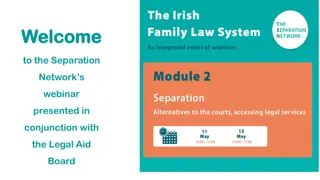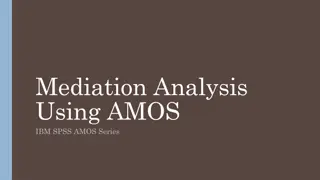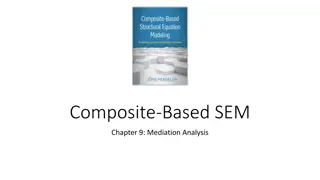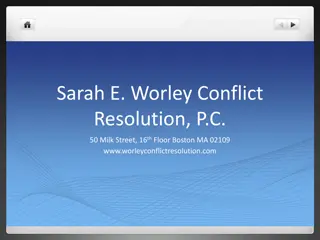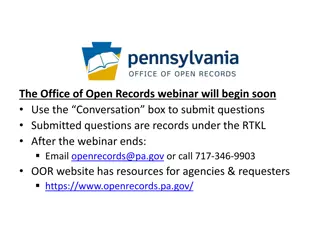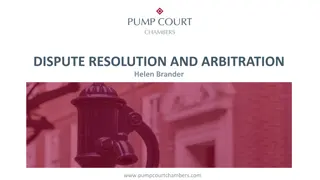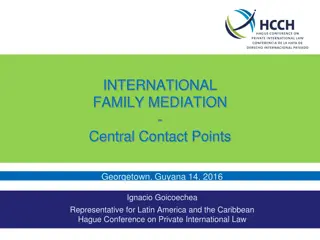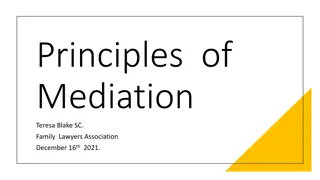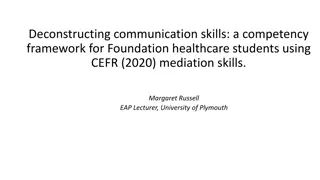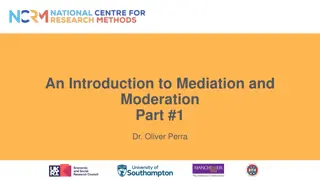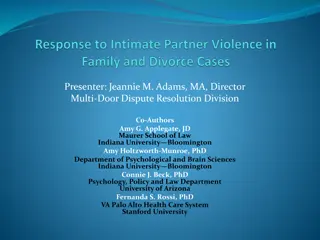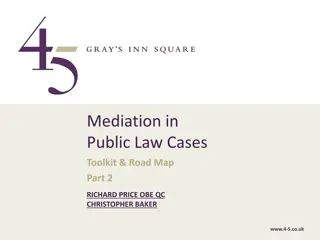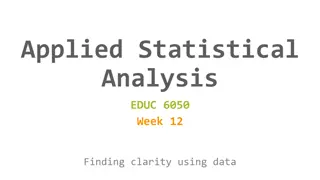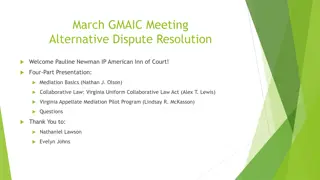Mediation and Transition on 24th May 2023
Join us on 24th May 2023 for an event focused on mediation and transition. Explore strategies, techniques, and discussions surrounding mediation processes and transitioning phases. This event provides a platform for individuals interested in managing change, conflict resolution, and transition planning. Expert speakers will share insights and practical tips to navigate through these periods effectively. Whether you're a professional in the field or looking to enhance personal skills, this event offers valuable resources and networking opportunities.
Download Presentation

Please find below an Image/Link to download the presentation.
The content on the website is provided AS IS for your information and personal use only. It may not be sold, licensed, or shared on other websites without obtaining consent from the author.If you encounter any issues during the download, it is possible that the publisher has removed the file from their server.
You are allowed to download the files provided on this website for personal or commercial use, subject to the condition that they are used lawfully. All files are the property of their respective owners.
The content on the website is provided AS IS for your information and personal use only. It may not be sold, licensed, or shared on other websites without obtaining consent from the author.
E N D
Presentation Transcript
Mediation and Transition 24thMay 2023
10.00-10.15 PCF Introduction-Julie Duff 10.15-10.45 Suzie Franklin - Mediation 10.45-11.15 Sean Donnelly- Annual Health Checks 11.15-11.45 Coffee Break 11.45 -12.30 Teresa King Care Act 12:30-1.00 Paul Arista Transition 1.00 -2:00 Lunch and Q&A
A free group for the parents and carers of children and young people who have any Special Educational Needs and Disabilities (SEND) working in partnership with professionals Led by a Steering Group made up of parent volunteers and professionals who work in SEND in Cheshire West and Chester Who we are: Who we are: Part of the National Network of Parent Carer Forums (NNPCF) www.nnpcf.org.uk Contact for families with disabled children www.contact.org.uk
To be the voice of as many parent carers as possible To be the strategic consultative body in the Borough representing the views of the families of children and young people with Special Educational Needs or Disabilities (SEND) The The purpose/aim purpose/aim of the PCF of the PCF is is To provide links with professional and voluntary organisations To ensure that all children and young people with SEND in the Borough are given the opportunity to achieve the best possible outcomes
Forum meetings Meet other parent carers and professionals Share experiences Learn about services in the area Presentations and group discussions Zoom and in-person events Third Sector Meetings Parent Management Group and Steering Group meetings 21 School Reps Mainstream and Special schools Focus Groups Wraparound Care, Working Parents, Complex Care, School Transport, Preparation for Adulthood Surveys Email, Newsletter, Facebook, website, YouTube! Training Strategic Meetings What we do: What we do:
Plans for Academic Plans for Academic Year 2023 Year 2023- -2024 2024 Transport Focus Group Update 5thJuly Zoom Topics for Forums next year Mental Capacity Act Live Well Meet the professionals Attendance and Exclusion What do the SEN team do? Short Break what are they, how can I access them? Direct Payment what are they and how can I access them?
What do we need What do we need from you? from you? Feedback What s worked well What hasn t worked well Even Better if Future Topics Do you want to join us?
How to contact us: How to contact us: contact.pcfcwac@gmail.com facebook.com/pcfcwac/ www.pcfcheshirewest.org www.youtube.com/@pcfcwac6168
SEND Mediation Suzie Franklin SEND Family Services Support Manager Phone: 0161 283 4848 Email: drs@togethertrust.org.uk Website: www.togethertrust.org.uk/mediation
Mediation is a process that offers parties in dispute an opportunity to discuss and explore their differences and reach an agreement, with the help of a trained, independent and impartial mediator. It offers a confidential, blame-free environment in which participants can contribute equally in finding a mutually acceptable solution. Professional Standards for Mediators Working With Special Educational Needs & Disability (SEND) 2018
Statutory provision under The Children and Families Act 2014 Non adversarial alternative to court procedures Informal, fair and equal for all Person centred child/young person involvement Helps reduce stress and time Focus on the issues not people, present not past Decision on the day forms the outcome
We would always encourage families to contact the Local Authority initially and/or SENDIASS to resolve any disagreements quickly and locally Mediation Disagreement Resolution Following a notice/decision letter At any point For specific reasons For any SEND reason Statutory timeframes - 30 days No timescales LA attendance is a legal duty LA attendance is voluntary To prevent tribunal appeals To prevent Section I tribunal appeals and complaints
Mediation can take place following decisions by a local authority: not to carry out an EHC needs assessment not to draw up an EHC plan after they receive a final EHC plan or amended plan following a decision not to amend an EHC plan or a decision to cease to maintain an EHC plan (Includes health and social care issues) SEND Code of Practice 2105
Parents and young people do not have to contact the mediation adviser prior to registering their appeal with the Tribunal if their appeal is solely about the name of the school, college or other institution named on the plan, the type of school, college or other institution specified in the plan or the fact that no school or other institution is named. SEND Code of Practice 2105
For disagreements which do not fall under mediation Section I only disagreements Special educational needs Health, social care provision made How statutory bodies carry out their education, care and health duties Disagreements between statutory bodies (latter do not involve P/YP) Local authorities must make disagreement resolution services available to parents and young people SEND Code of Practice 2105
The Local Authority: Must make known to parents and young people the possibility of resolving disagreements across education, health and social care through disagreement resolution and mediation procedures and education, health and social care providers Must include details in the Local Offer Must pay reasonable expenses of the parent or young person where they arrange the mediation SEND Code of Practice 2105
The local Authority: Must arrange for mediation between it and the parent or young person Must ensure that the mediation is conducted by an independent person Must participate in the mediation Must have decision making authority Each responsible commissioning body must also participate in the mediation - health and social care SEND Code of Practice 2105
The local Authority: If the parent or young person decides to proceed with mediation then the local authority must ensure that a mediation session takes place within 30 days of the mediation adviser informing the local authority that the parent or young person wants to go to mediation, although it may delegate the arrangement of the session to the mediator. Parents or young people do not have to pay for the mediation session(s). The local authority must attend the mediation. SEND Code of Practice 2105
When the local authority sends the parent or young person notice of a decision which can be appealed to the Tribunal it must tell the parent or young person of their right to go to mediation and that they must contact a mediation adviser before registering an appeal with the Tribunal. The notice must give the contact details of a mediation adviser SEND Code of Practice 2105
Mediation information advice is given to parents and young people: it should be factual and unbiased it should not seek to pressure them into going to mediation. Where there is more than one available, the mediation adviser should not try to persuade the parents or young people to use any particular mediator SEND Code of Practice 2105
Mediation certificates - required to lodge an appeal with the SEND Tribunal Part 1 if a parent or young person has considered mediation but decides to lodge an appeal without attending mediation Part 2 following mediation (if the mediation meeting takes place within 30 days of the request to the Local Authority) Part 3 If mediation hasn t taken place within 30 days of referral to ensure the right of appeal is not lost
Mediation can still take place until the certificate expires after 30 days from the date of issue (one mediation certificate per case)
For mediation to work well: The mediation session should be arranged, in discussion with the parents/young person and LA, at a place and a time which is convenient for the parties The mediator should play a key role in clarifying the nature of the disagreement and ensuring that both sides are ready for the mediation session The mediator should agree with the parties on who needs to be there Mediators must have sufficient knowledge of the legislation relating to SEND, health and social care to be able to conduct the mediation SEND Code of Practice 2105
The local authority and health commissioner representative(s) should be sufficiently senior and have the authority to be able to make decisions during the mediation session The parents or young person may be accompanied by a friend, adviser or advocate Both parties should be open about all the aspects of the disagreement and not hold anything back for a possible appeal to the Tribunal Legal representation should not be necessary at the mediation, but this will be a matter for the parties and the mediator to agree https://www.bailii.org/ew/cases/EWHC/Admin/2020/3326.html SEND Code of Practice 2105
Is mediation legally binding?
SEND Regulations 2014 Steps to be taken by a local authority (Reg 42) (1) This regulation applies where mediation has taken place and the parties to the mediation reach an agreement, to be recorded in writing ( the mediation agreement ). (2) Where the mediation issues in the mediation agreement are those on which the child s parent or young person has a right to appeal to the First-tier Tribunal, the local authority shall comply with the time limits set out in regulation 44, as if the mediation agreement were an order of the First tier Tribunal.
SEND Regulations 2014 (3) Where the mediation agreement requires the local authority or responsible commissioning body to do something in relation to which the child s parent or young person has no right of appeal to the First-tier Tribunal, the local authority or responsible commissioning body must do that thing within two weeks of the date of the mediation agreement
Before mediation Initial call with parent/young person Referral to LA and request for dates Liaise with attendees - arrange date and suitable venue Confirm arrangements with all parties Mediator makes contact with all attendees Preparatory calls (sharing any new information/evidence)
At the mediation/DR meeting Introductions Uninterrupted time Clarifying issues and agenda setting Discussions and resolutions Working towards agreements Outcome statement/certificate End of meeting
Any questions, comments or feedback?
What is Annual Health Check Annual health checks are for people with a learning disability who are over 14 years old. They are done by your doctor or nurse once a year They help people stay healthy
Why is it good to have an Annual Health Check? You can talk to your doctor about anything you are worried about. Get to know your doctor or health professional better. You can get ideas about how to be more healthy. If there is anything wrong then the doctor can sort it out before it gets worse.
What Happens in Annual Health Check Don't Miss Out - our stories - YouTube
What happens at your Annual Health Check? A doctor or nurse from your surgery may: Check things about your body, like your heart and blood pressure. Ask about any medicines you are taking.
What happens at your Annual Health Check? Ask about the food you eat. Check your blood and your wee. Ask about how you are feeling.
Top tips for your Annual Health Check You can bring someone with you if you like. Ask the doctor to explain anything you do not understand Tell the doctor how you really feel, it will help them to help you.
Top tips for your Annual Health Check Take your time. You can say no if there is a part of the health check you do not want to do. Remember, your doctor is there to help you, so you do not need to feel worried.
Health action plans Ask your doctor to give you a health action plan at your Annual Health Check A health action plan is written by you and your doctor. A health action plan tells you the things you need to do to keep healthy.
Health action plans Like getting enough sleep or talking to someone when you feel worried. It says how you will get the support you need with your health. Like how your doctor can make sure your appointments are easy to understand.
ANNUAL HEALTH CHECK SURVEY ANNUAL HEALTH CHECK SURVEY FEEDBACK FEEDBACK An easy read survey is now live at the link below Annual Health Check - feedback Survey (surveymonkey.co.uk) The survey is for people with learning disabilities aged 14+ to tell us about their experience of the annual health check The results will help us find out what is working well and what we can do to improve the annual health checks.
Overview The Care Act 2014 requires councils to promote the individual wellbeing of adults with care and support needs and carers in their area by providing or arranging for the provision of prevention/ early intervention services to avoid or delay the development of support needs including specific duties to provide information and advice; safeguard adults at risk of abuse or neglect; support the transition to adulthood. The Act created a single, consistent route to establishing an entitlement to public care and support for all adults with needs for care and support. It also creates the first ever entitlement to support for carers, on a similar basis.
Care Act 2014-Assessment Anybody, including a carer, who appears to need care or support is entitled to an assessment. Outcomes Focused Any needs currently being met by a carer should still be included in the assessment. The local authority must then apply a national eligibility threshold to determine whether the individual has eligible needs.
Eligibility Criteria The Care Act has a national eligibility criteria, which local authorities must use. Eligibility under the Care Act triggers a legal duty for the local authority to meet a person s needs For an adult three questions determine eligibility: Impairment or illness- Do the adults needs arise from, or are they related to a physical or mental impairment or illness? Outcomes-Because of those needs, is the adult unable to achieve two or more of the outcomes listed in the regulations? AND Wellbeing- Consequently , is there, or is there likely to be, a significant impact on the adults wellbeing? Eligibility depends on a yes to all three.
Eligible Outcomes Managing and maintaining nutrition Maintaining personal hygiene Managing toilet needs Being appropriately clothed Being able to make use of the adult s home safely Maintaining a habitable home environment Developing and maintaining family or other personal relationships Accessing and engaging in work, training, education or volunteering Making use of necessary facilities or services in the local community including public transport and recreational facilities or services Carrying out any caring responsibilities the adult has for a child Care and Support (Eligibility Criteria) Regulations 2015
For the purposes of this regulation an adult is to be regarded as being unable to achieve an outcome if the adult (a)is unable to achieve it without assistance; (b) is able to achieve it without assistance but doing so causes the adult significant pain, distress or anxiety; (c)is able to achieve it without assistance but doing so endangers or is likely to endanger the health or safety of the adult, or of others; or (d)is able to achieve it without assistance but takes significantly longer than would normally be expected. (4) Where the level of an adult s needs fluctuates, in determining whether the adult s needs meet the eligibility criteria, the local authority must take into account the adult s circumstances over such period as it considers necessary to establish accurately the adult s level of need.




